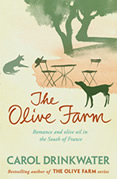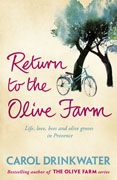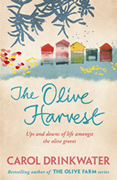August 2011
Have we celebrated Bastille Day, the fourteenth of July, already? Yes, indeed. We sat out on the terrace, enjoying a late barbecue watching fireworks shooting into the sky from every Provençal village encircling us. The most spectacular, of course, were those down at the coast in Cannes.
The year seems to be running ahead of me and I cannot quite keep up.
We have been working very hard on the land and in our on-going quest to deliver healthy pesticide-free crops I am becoming rather quirkily creative and trying out new methods.
During my recent travels for the Olive Route TV film series, I have made several excursions to Sicily. Those who know my books and articles will remember how very much I love this island and on each visit I seem to discover yet another fascinating aspect of it. I was fortunate on my last trip in March to meet a family of chemists who also happen to be olive farmers. Nico, the septuagenarian head of the household, recounted to me an amusing story of how his great-grandfather, also a chemist, saved Sicily by curing Garibaldi of diarrhoea. When the military hero, Giuseppe Garibaldi (born in Nice, by the way, when Nice was not part of France), landed at Marsala on the west of the island on 11 May 1860, he was in acute discomfort and was unable to leave his bed or disembark his boat. This was disastrous because he was there to liberate the island, to unify it with the mainland and include it in the new state of Italy.
Medical assistance was urgently required. In the town of Marsala, a celebrated chemist, Nico’s ancestor, resided. He hastened to the port, prescribed a potent potion and, hey, presto, the great soldier was fit and well again. As the story goes, the following morning Garibaldi strode from his boat hale and hearty and with his army of red-shirted soldiers at his side, he freed Sicily with little difficulty. So, Nico claims with a flourish, it is all due to his great grandfather’s efficient potion that today Sicily is a part of Italy.
Perhaps the yarn is a little fanciful, a little elaborated, but I was tickled by it.
Nico, who recounted this proud tale of his ancestor, has been an organic olive farmer since 1980. This was before Sicily knew anything at all about organic farming. In other words, he was ahead of his time and I was keen to hear from him how he looks after his trees and keeps the dreaded olive fly from destroying the fruits.
‘Sardines,’ was his reply.
‘Sardines!’ I exclaimed.
He nodded. Olive farming is a hobby to this man even though he has a fine plantation counting five thousand trees. As a chemist, he understands the dangers chemical substances can cause on the land: dangerous for the soil and the groundwater as well as to those who were enjoying the oil pressed from his sprayed fruits. He set himself the challenge of finding a natural alternative and spent three years in the quest. During this period, he experimented with forty-nine substances and lost his crop on each occasion. Everyone thought he was a madman and he admitted to me that had he been trying to earn a living as an olive farmer he could not have afforded to be so philanthropic. However, he was in a position to experiment and with his chemist’s knowledge and education he spent hours working out balances of this and that to combat the fly, to repel it. Eventually, goodness knows why, he decided to hang a freshly-caught sardine from every tree. Of course, he was almost laughed off the island. No one took him seriously, but at the end of the season when the crop was ready to pick, he had tree-loads of fine fat olives and not one was blighted by the fly. He wrote to the agricultural department of the local university. People came from far and wide to study what he was up to, and to this day, the process has continued to bear fine healthy fruits and Nico’s olive oil is winning awards all across Europe.
After quizzing him for precise details, I returned to our olive farm with his knowledge and we decided that we would try it. Since early summer, Michel and I have been occupying ourselves with this challenge. Setting off early in the mornings to the fishmonger to buy freshly caught sardines, a few dozen at a time. Since March I have been collecting our emptied mineral bottles. We cut these in half and attach the lower part with garden wire. We place a sardine into each – one per bottle – and then cover the fish with water and hang the halved bottle from an olive branch. One bottled sardine per tree. It’s a hot smelly business, I can promise you and we have been keeping it for the early evenings. On Bastille Day, the sardines, fresh in off the boats that morning, smelt so delicious that we decided to keep six aside to barbecue for our supper on the terrace. We sat out with a chilled bottle of Sancerre after having grilled the fish and watched the fireworks.
Will this experiment work? We won’t know the results until the autumn but fingers crossed it is as efficient in the south of France as it is proving to be in Sicily.
All summer as the days grow hotter, I have been fearing that the land might smell of fish but so far it remains as sweetly scented as ever. The whole process has to be repeated in September when we need to replace the sardines. It all sounds quite mad, doesn’t it? Well, I will let you know later in the year whether we have succeeded or not. Anyway, we enjoyed our Bastille evening with the freshly caught grilled poisson!
And I have since learnt that there is a fish commonly called Garibaldi damselfish (Hypsypops rubicundus), a bright orange creature, native to the Californian waters of the Pacific Ocean, so named because its colour is reminiscent of the red shirts worn by Garibaldi’s soldiers. How about that!
All my Olive books are now on Kindle, so if you are looking for entertaining reading for your e-book, please do buy them. For those of you who are firmly set in the real book world, Susan Lamb, the Managing Director of Orion Publishing, has started to give the Olive series a new look, and I think these latest covers are very enticing.
Here are a couple of examples. Please do let me know what you think.
 |
 |
 |
Why not offer them as beach or birthday gifts if you have read them yourself?
We continue with our work on The Olive Route TV series. It has been fascinating and I have to admit a challenging process so far. Events in Europe and the Arab Spring have meant that I have been obliged to rethink destinations and seek out different stories. After I had finished my two years of travelling, circumnavigating the Mediterranean for the books The Olive Route and The Olive Tree, I remarked that if I made these journeys twenty times over I would discover new stories every time. Someone must have picked this up as a challenge! I have been on the road for much of this year and my knowledge of life around the Med, places to visit, olive stories to narrate, has grown phenomenally. I am learning so much and I sincerely hope that a small part of all these wonderful discoveries will be there on screen for you all to view in a year or so.
Many readers have written to ask me whether the films will be available on DVD. The answer is yes, definitely, but please let us complete them first and then, next year, I will post a link to where they can be purchased.
Who would ever have thought that when I fell in love with my husband, Michel, and, long before we married, we found a truly derelict house with land overlooking the Bay of Cannes, that it would lead to all this. Life is magical and always full of surprises.
If you have not joined us on Facebook yet, please do so. The link is: http://www.facebook.com/olive.farm
Genuinely, there is a fabulous group of people there and we are from all over the world, all walks of life. It is supportive, friendly and really quite educative as everyone has their own experiences to share about travelling or farming or simply a love of life. I have made some good and enduring new friends there.
Thank you for being here and reading this. Huge thanks to Julia Pidduck who runs these website pages for me and to Orion for their ongoing commitment to the books. Enjoy the rest of your summer or winter, wherever you are.
Blessings,
Carol






